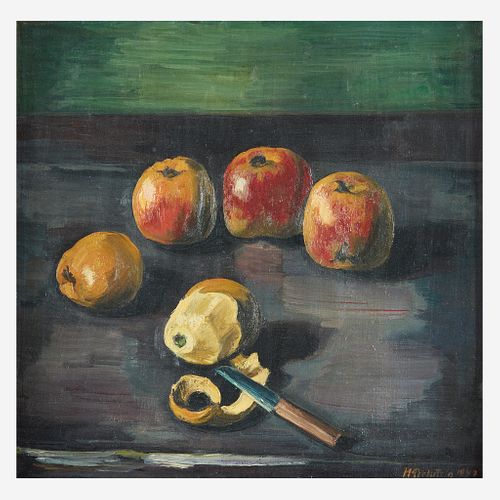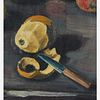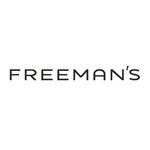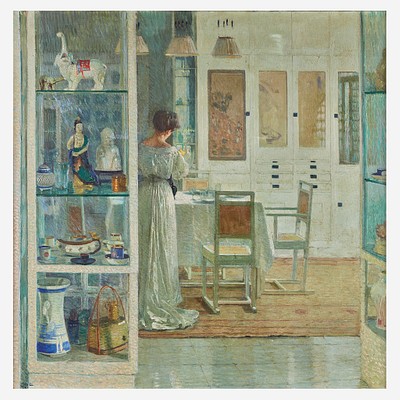Max Pechstein (German, 1881-1955), , Äpfel
About Seller
2400 Market St
Philadelphia, PA 19147
United States
Established in 1805, Freeman’s Auction House holds tradition close, with a progressive mind-set towards marketing and promotion, along with access to a team of top experts in the auction business. And now with offices in New England, the Southeast, and on the West Coast, it has never been easier to ...Read more
Two ways to bid:
- Leave a max absentee bid and the platform will bid on your behalf up to your maximum bid during the live auction.
- Bid live during the auction and your bids will be submitted real-time to the auctioneer.
Bid Increments
| Price | Bid Increment |
|---|---|
| $0 | $25 |
| $500 | $50 |
| $1,000 | $100 |
| $2,000 | $200 |
| $3,000 | $250 |
| $5,000 | $500 |
| $10,000 | $1,000 |
| $20,000 | $2,000 |
| $30,000 | $2,500 |
| $50,000 | $5,000 |
| $100,000 | $10,000 |
About Auction
Feb 23, 2021
A collection of important European artworks including an important rediscovered painting by Carl Moll, and three newly authenticated works by 17th century French and Italian Masters, Valentin de Boulogne, Carlo Dolci and Lionello Spada. Curated by David Weiss, Head of Sale. Freeman's info@freemansauction.com
- Lot Description
Max Pechstein (German, 1881-1955)
Äpfel
Signed 'M. PECHSTEIN' and erroneously dated 1947 bottom right; also signed and titled verso; with the Artist's address verso, oil on canvas
19 3/8 x 19 7/16 in. (49.2 x 49.4cm)
Executed circa 1928.
PROVENANCE:
Private Collection, Virginia (by descent in the family).
LITERATURE:
Aya Soika, Max Pechstein: das Werkverzeichnis der Ölgemälde, Volume II, Munich, 2011, no. 1928/4.
NOTE:
A prolific painter and printmaker, Max Pechstein is perhaps best known as a German Expressionist painter of the Die Brücke group in the years before World War I. Invited to the group by Erich Heckel, Pechstein joined other painters, including Ernst Ludwig Kirchner and Emil Nolde, all of whom helped define a particular emotionally charged style of painting that looked to the French Fauves and primitivist art, using strong, vibrant color and angularity of lines and shapes. Pechstein spent most of the year 1908 in Paris where he experienced the work of the Fauves first hand, including Henri Matisse and Paul Gauguin, later that year moving to Berlin and seeing Matisse’s paintings again at Paul Cassirer Gallery. Inspired aesthetically by their French contemporaries, the Die Brücke artists were known to have created more sexually explicit and disquieting imagery in their quest for freedom from traditional social and political institutions.
In 1910, as Pechstein was reaching his mature style, the artist was rejected by the Berlin Secession exhibition and went on to form the New Secession group, still promoting the ideas and aesthetics of Expressionism. Pechstein was later expelled from the group as he gained wider, more popular appeal, which distanced him from his peers. In 1914, the artist and his wife, in search of inspiration from more primitive art forms, traveled to Palau where they were captured and imprisoned in Japan at the start of the First World War. They were later sent back to Germany and Pechstein fought in the war, becoming a more radical Socialist politically as the war drew to a close.
After his service, Pechstein returned to Berlin and held a professorship teaching art at the Berlin Academy, experiencing a burst of creative energy and revisiting his Expressionist style of painting. In the following years he grappled with depression, especially during the long, cold German winters, and he sought refuge at a vacation home in the fishing village and artist colony of Nidden (Nida, Lithuania). It was during this time in the 1920s that Pechstein painted the present work Äpfel, recalling his early influences Matisse and Cézanne, with his apples precariously hanging in space on the flattened table. Stripping away the former opulent color and vibrant brushstrokes, Pechstein’s apples sit heavily in compressed space, falling forward toward the viewer. The painting is erroneously dated 1947—more likely the date the artist sold the work than when it was painted—as the inscription of Pechstein’s Berlin address in the artist’s hand on the back of the canvas indicates that the painting comes from the late 1920s, and its stylistic similarities with other still lifes of that period confirm this date. This concise composition provides a charming example of Pechstein’s work between the wars, and elucidates how he brought his early influences to bear while engaging his new personal and political reality.
- Shipping Info
-
No lot may be removed from Freeman’s premises until the buyer has paid in full the purchase price therefor including Buyer’s Premium or has satisfied such terms that Freeman’s, in its sole discretion, shall require. Subject to the foregoing, all Property shall be paid for and removed by the buyer at his/ her expense within ten (10) days of sale and, if not so removed, may be sold by Freeman’s, or sent by Freeman’s to a third-party storage facility, at the sole risk and charge of the buyer(s), and Freeman’s may prohibit the buyer from participating, directly or indirectly, as a bidder or buyer in any future sale or sales. In addition to other remedies available to Freeman’s by law, Freeman’s reserves the right to impose a late charge of 1.5% per month of the total purchase price on any balance remaining ten (10) days after the day of sale. If Property is not removed by the buyer within ten (10) days, a handling charge of 2% of the total purchase price per month from the tenth day after the sale until removal by the buyer shall be payable to Freeman’s by the buyer. Freeman’s will not be responsible for any loss, damage, theft, or otherwise responsible for any goods left in Freeman’s possession after ten (10) days. If the foregoing conditions or any applicable provisions of law are not complied with, in addition to other remedies available to Freeman’s and the Consignor (including without limitation the right to hold the buyer(s) liable for the bid price) Freeman’s, at its option, may either cancel the sale, retaining as liquidated damages all payments made by the buyer(s), or resell the property. In such event, the buyer(s) shall remain liable for any deficiency in the original purchase price and will also be responsible for all costs, including warehousing, the expense of the ultimate sale, and Freeman’s commission at its regular rates together with all related and incidental charges, including legal fees. Payment is a precondition to removal. Payment shall be by cash, certified check or similar bank draft, or any other method approved by Freeman’s. Checks will not be deemed to constitute payment until cleared. Any exceptions must be made upon Freeman’s written approval of credit prior to sale. In addition, a defaulting buyer will be deemed to have granted and assigned to Freeman’s, a continuing security interest of first priority in any property or money of, or owing to such buyer in Freeman’s possession, and Freeman’s may retain and apply such property or money as collateral security for the obligations due to Freeman’s. Freeman’s shall have all of the rights accorded a secured party under the Pennsylvania Uniform Commercial Code.
-
- Buyer's Premium



 EUR
EUR CAD
CAD AUD
AUD GBP
GBP MXN
MXN HKD
HKD CNY
CNY MYR
MYR SEK
SEK SGD
SGD CHF
CHF THB
THB













